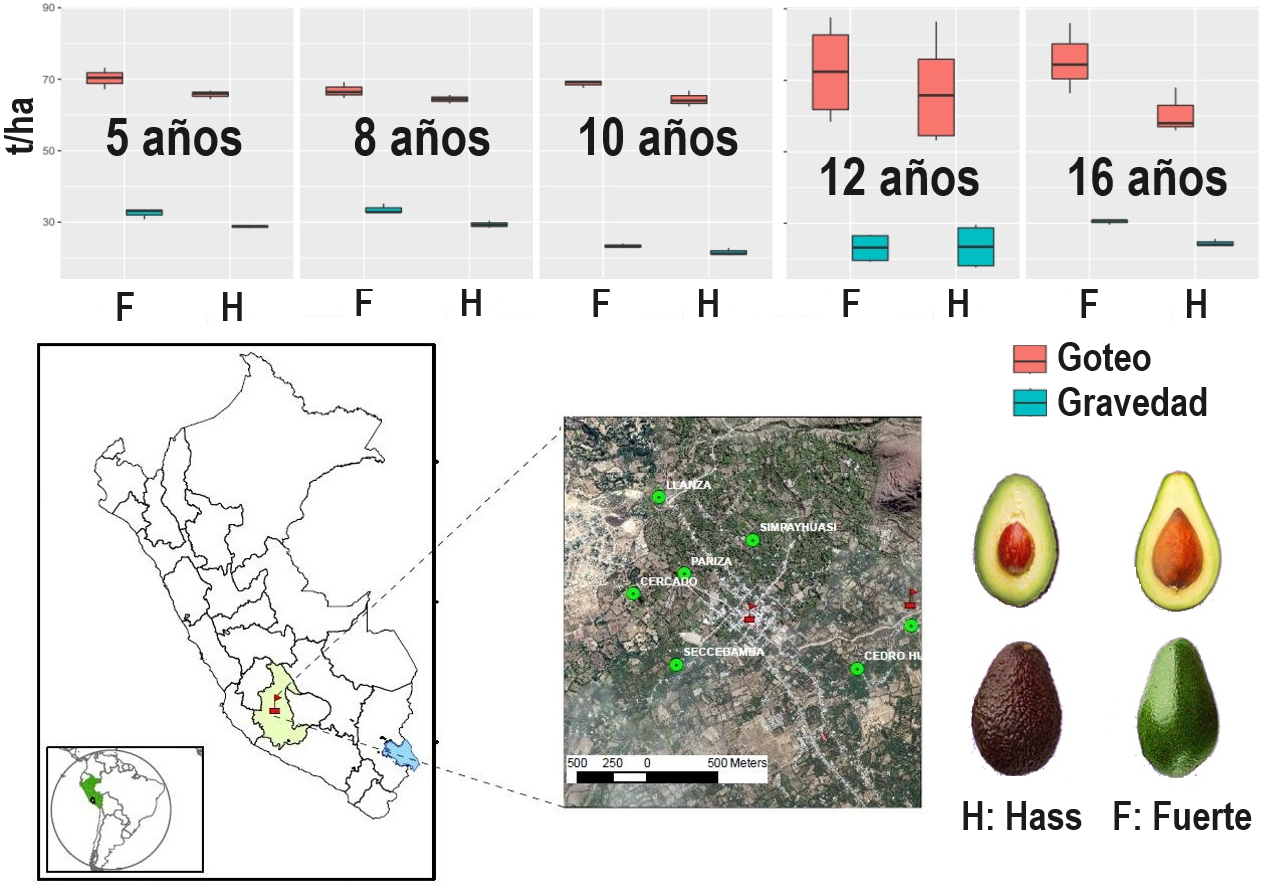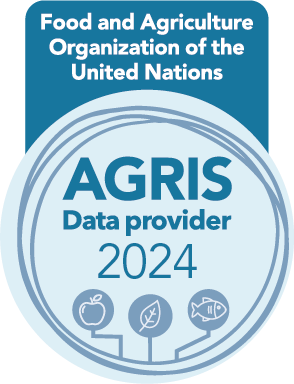Ajuste osmótico y rendimiento de dos variedades de palta (Persea americana), Hass y Fuerte, con sistema de riego por goteo, en zona andina del Perú
DOI:
https://doi.org/10.17268/sci.agropecu.2024.017Palabras clave:
Potencial de rendimiento, frutales alto-andinos, eficiencia de riegoResumen
El cultivo de palta (Persea americana) no solo es esencial desde el punto de vista económico, sino que también desempeña un papel crucial en la alimentación, la salud y el bienestar de las poblaciones en todo el mundo. El estudio se realizó en Ayacucho-Perú (latitud: 12° 53’ 57’’ S, longitud: 74° 16’ 55’’ O y altitud: 2596 msnm), con el objetivo de evaluar el efecto de la utilización del sistema de riego tecnificado por goteo en la producción y rendimiento de dos variedades de palta, Hass y Fuerte. El estudio estuvo basado en el uso de un sistema de riego con programación por tratamiento con plantas de palta instaladas en parcelas de 500 m² en 6 sectores, con una densidad de 5 x 5 m, cuya edad estuvo entre 5 a 16 años, de las cuales se consideró 12 plantas (6 plantas con riego por goteo y 6 plantas como testigo con riego por gravedad). Los riegos se efectuaron justo en la etapa de floración y producción garantizando el suministro de agua adecuado en periodos de déficit hídrico, entre febrero a junio de 2022. La cosecha realizada reporto rendimientos 67,96 ± 8,8 t/ha bajo riego tecnificado y de 26,42 ± 4,93 t/ha en riego por gravedad, siendo un incremento del 157% con respecto a este último. En cuanto a las variedades, la palta Fuerte tuvo el mayor rendimiento 49,38 ± 23,06 t/ha con respecto a la variedad Hass (45,0 ± 21,14 t/ha), el rendimiento máximo se dio con riego por goteo para a variedad Fuerte (71,09 ± 8,38 t/ha), esto es explicado por el gasto de energía en el potencial de ajuste osmótico la cual disminuye drásticamente el potencial de rendimiento con riego tradicional por gravedad, obteniendo un rendimiento mínimo en Hass de 25,18 ± 4,44 t/ha.
Citas
Anjum, S. A., Xie, X., Wang, L. C., Saleem, M. F., Man, C., & Lei, W. (2011). Morphological, physiological and biochemical responses of plants to drought stress. African journal of agricultural research, 6(9), 2026-2032. https://doi.org/10.5897/AJAR10.027
Arif, Y., Singh, P., Siddiqui, H., Bajguz, A., & Hayat, S. (2020). Salinity induced physiological and biochemical changes in plants: An omic approach towards salt stress tolerance. Plant Physiology and Biochemistry, 16, 64-77. doi:10.1016/j.plaphy.2020.08.042
Bayu, T., Kim, H., & Oki, T. (2020). Water governance contribution to water and sanitation access equality in developing countries. Water Resources Research, 56(4), e2019WR025330. https://doi.org/10.1029/2019WR025330
Bharath, P., Gahir, S., & Raghavendra, A. S. (2021). Abscisic acid-induced stomatal closure: An important component of plant defense against abiotic and biotic stress. Frontiers in Plant Science, 12, 615114. https://doi.org/10.3389/fpls.2021.615114
Bhattacharya, A. (2021). Mineral nutrition of plants under soil water deficit condition: A Review. In: Soil water deficit and physiological issues in plants. Springer, Singapore. https://doi.org/10.1007/978-981-33-6276-5_4
Campbell, B. M., Vermeulen, S. J., Aggarwal, P. K., Corner-Dolloff, C., Girvetz, E., et al. (2016). Reducing risks to food security from climate change. Global Food Security, 11, 34-43. DOI: https://doi.org/10.1016/j.gfs.2016.06.002
Cárceles Rodríguez, B., Durán Zuazo, V. H., Franco Tarifa, D., Cuadros Tavira, S., Sacristan, P. C., & García-Tejero, I. F. (2023). Irrigation alternatives for avocado (Persea americana Mill.) in the Mediterranean subtropical region in the context of climate change: A review. Agriculture, 13(5), 1049. https://doi.org/10.3390/agriculture13051049
Carr, M. K. V. (2012). The water relations and irrigation requirements of citrus (Citrus spp.): A review. Experimental agriculture, 48(3), 347-377. DOI: https://doi.org/10.1017/S0014479712000038
Chen, H., & Jiang, J.-G. (2010). Osmotic adjustment and plant adaptation to environmental changes related to drought and salinity. Environmental Reviews, 18, 309–319. doi:10.1139/a10-014
Delatorre-Herrera, J., Arena, J., Delatorre-Castillo, J., & Carevic, F. (2021). Uso eficiente del agua de tres especies (Quinua, Aloe y Prosopis) y estrategias de riego deficitario. Organización de las Naciones Unidas para la Educación, la Ciencia y la Cultura (UNESCO), Montevideo 11200, Uruguay.
D’Odorico, P., Chiarelli, D. D., Rosa, L., Bini, A., Zilberman, D., & Rulli, M. C. (2020). The global value of water in agriculture. Proceedings of the national academy of sciences, 117(36), 21985-21993. https://doi.org/10.1073/pnas.2005835117
Erazo-Mesa, E., Ramírez-Gil, J. G., & Sánchez, A. E. (2021). Avocado cv. Hass needs water irrigation in tropical precipitation regime: Evidence from Colombia. Water, 13(14), 1942. https://doi.org/10.3390/w13141942
Fang, Y., & Xiong, L. (2015). General mechanisms of drought response and their application in drought resistance improvement in plants. Cellular and molecular life sciences, 72, 673-689. https://doi.org/10.1007/s00018-014-1767-0
Hailu, B., & Mehari, H. (2021). Impacts of soil salinity/sodicity on soil-water relations and plant growth in dry land areas: A review. J. Nat. Sci. Res, 12, 1-10. https://doi.org/10.7176/JNSR/12-3-01
Hsu, P. K., Dubeaux, G., Takahashi, Y., & Schroeder, J. I. (2021). Signaling mechanisms in abscisic acid‐mediated stomatal closure. The Plant Journal, 105(2), 307-321. https://doi.org/10.1111/tpj.15067
Lee, M., Kim, H., Lee, J. Y., Yang, J. E., & Lim, C. (2022). A shift towards integrated and adaptive water management in South Korea: Building resilience against climate change. Water Resources Management, 36(5), 1611-1625. https://doi.org/10.1007/s11269-022-03071-x
Mekonnen, M. M., Pahlow, M., Aldaya, M. M., Zarate, E., & Hoekstra, A. Y. (2015). Sustainability, efficiency and equitability of water consumption and pollution in Latin America and the Caribbean. Sustainability, 7(2), 2086-2112. https://doi.org/10.3390/su7022086
Minhas, P. S., & Bajwa, M. S. (2021). Use and management of poor quality waters for the rice-wheat based production system. In The Rice-Wheat Cropping System of South Asia (pp. 273-306). CRC Press.
Morales, F., Ancín, M., Fakhet, D., González-Torralba, J., Gámez, A. L., et al. (2020). Photosynthetic metabolism under stressful growth conditions as a bases for crop breeding and yield improvement. Plants, 9(1), 88. https://doi.org/10.3390/plants9010088
Munemasa, S., Hauser, F., Park, J., Waadt, R., Brandt, B., & Schroeder, J. I. (2015). Mechanisms of abscisic acid-mediated control of stomatal aperture. Current opinion in plant biology, 28, 154-162. https://doi.org/10.1016/j.pbi.2015.10.010
Opazo, I., Pimentel, P., Salvatierra, A., Ortiz M., Toro, G., & Garrido-Salinas, M. (2024). Water stress tolerance is coordinated with water use capacity and growth under water deficit across six fruit tree species. Irrigation Science, 1-15. https://doi.org/10.1007/s00271-024-00915-9
Ozturk, M., Turkyilmaz Unal, B., García‐Caparrós, P., Khursheed, A., Gul, A., & Hasanuzzaman, M. (2021). Osmoregulation and its actions during the drought stress in plants. Physiologia plantarum, 172(2), 1321-1335. https://doi.org/10.1111/ppl.13297
Pannunzio, A., Vilella, F., Texeira, P., & Premuzik, Z. (2011). Impacto de los sistemas de riego por goteo en arándanos. Revista Brasileira de Engenharia Agrícola e Ambiental, 15, 03-08. https://doi.org/10.1590/S1415-43662011000100001
Pantin, F., Monnet, F., Jannaud, D., Costa, J. M., Renaud, J., et al. (2013). The dual effect of abscisic acid on stomata. New Phytologist, 197(1), 65-72. https://doi.org/10.1111/nph.12013
Patanè, C., & Cosentino, S. L. (2010). Effects of soil water deficit on yield and quality of processing tomato under a Mediterranean climate. Agricultural water management, 97(1), 131-138. https://doi.org/10.1016/j.agwat.2009.08.021
Pottosin, I., & Dobrovinskaya, O. (2014). Non-selective cation channels in plasma and vacuolar membranes and their contribution to K+ transport. Journal of Plant Physiology, 171(9), 732-742. https://doi.org/10.1016/j.jplph.2013.11.013
Prasad, P. V. V., Staggenborg, S. A., & Ristic, Z. (2008). Impacts of drought and/or heat stress on physiological, developmental, growth, and yield processes of crop plants. In: Response of crops to limited water: Understanding and modeling water stress effects on plant growth processes. Chapter 11: 301-355. https://doi.org/10.2134/advagricsystmodel1.c11
Ringler, C., Bhaduri, A., & Lawford, R. (2013). The nexus across water, energy, land and food (WELF): potential for improved resource use efficiency? Current Opinion in Environmental Sustainability, 5(6), 617-624. https://doi.org/10.1016/j.cosust.2013.11.002
Seleiman, M. F., Al-Suhaibani, N., Ali, N., Akmal, M., Alotaibi, M., Refay, Y., & Battaglia, M. L. (2021). Drought stress impacts on plants and different approaches to alleviate its adverse effects. Plants, 10(2), 259. https://doi.org/10.3390/plants10020259
Zarate, E., Aldaya, M., Chico, D., Pahlow, M., Flachsbarth, I., et al. (2014). Water and agriculture. Water for Food and Wellbeing in Latin America and the Caribbean. Social and Environmental Implications for a Globalized Economy, 177-212.
Zhao, W., Liu, L., Shen, Q., Yang, J., Han, X., Tian, F., & Wu, J. (2020). Effects of water stress on photosynthesis, yield, and water use efficiency in winter wheat. Water, 12(8), 2127. https://doi.org/10.3390/w12082127
Zhu, J., Xu, N., Siddique, K. H., Zhang, Z., & Niu, W. (2022). Aerated drip irrigation improves water and nitrogen uptake efficiencies of tomato roots with associated changes in the antioxidant system. Scientia Horticulturae, 306, 111471. https://doi.org/10.1016/j.scienta.2022.111471

Publicado
Cómo citar
Número
Sección
Licencia
Derechos de autor 2024 Scientia Agropecuaria

Esta obra está bajo una licencia internacional Creative Commons Atribución-NoComercial 4.0.
Los autores que publican en esta revista aceptan los siguientes términos:
a. Los autores conservan los derechos de autor y conceden a la revista el derecho publicación, simultáneamente licenciada bajo una licencia de Creative Commons que permite a otros compartir el trabajo, pero citando la publicación inicial en esta revista.
b. Los autores pueden celebrar acuerdos contractuales adicionales separados para la distribución no exclusiva de la versión publicada de la obra de la revista (por ejemplo, publicarla en un repositorio institucional o publicarla en un libro), pero citando la publicación inicial en esta revista.
c. Se permite y anima a los autores a publicar su trabajo en línea (por ejemplo, en repositorios institucionales o en su sitio web) antes y durante el proceso de presentación, ya que puede conducir a intercambios productivos, así como una mayor citación del trabajo publicado (ver efecto del acceso abierto).




